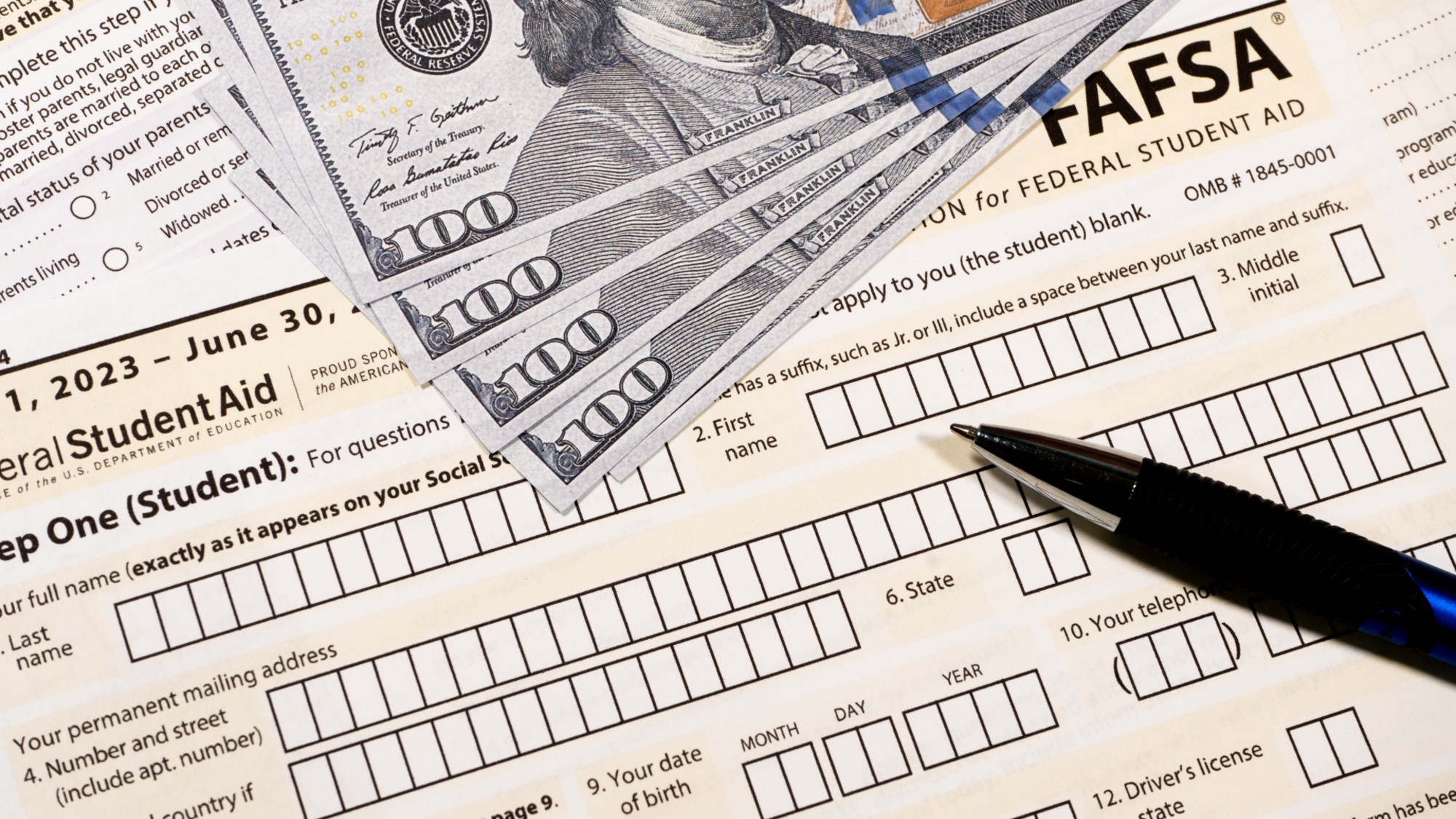How to boost your finances with passive income
Could your spare room or empty driveway be an untapped source of cash?

A free daily email with the biggest news stories of the day – and the best features from TheWeek.com
You are now subscribed
Your newsletter sign-up was successful

When you make a purchase through links on our site, we may earn a commission
High inflation and rising interest rates may force many households to consider ways to generate extra income to cope with the rising cost of living.
Rather than taking on a second or third job, some people are earning what is known as passive income, said Forbes Advisor. This can be “a good way of supplementing your household earnings to provide a safety buffer when finances are tight”.
The Week
Escape your echo chamber. Get the facts behind the news, plus analysis from multiple perspectives.

Sign up for The Week's Free Newsletters
From our morning news briefing to a weekly Good News Newsletter, get the best of The Week delivered directly to your inbox.
From our morning news briefing to a weekly Good News Newsletter, get the best of The Week delivered directly to your inbox.
Generating passive income “should require only minimal monitoring on an ongoing basis”, the site added.
It is a “steady flow of cash”, explained NerdWallet, that you earn outside your day job or normal career.
“The key is to focus on low-maintenance side hustles”, said Save The Student, and to generate earnings without being tied to a set amount of hours.
Here are some of the best ways to boost your earnings with passive income.
A free daily email with the biggest news stories of the day – and the best features from TheWeek.com
Investing
The interest you earn from putting money into savings accounts or returns from investing in the stock market can generate passive income.
The idea is that you make your money work for you by receiving regular payouts without further effort beyond the initial research of deciding where to put your funds.
Buying dividend stocks – companies that make regular payments to investors – can be a great choice for investors who want to achieve a passive income, said MoneyWeek.
The amount you receive is known as the dividend yield, calculated by dividing the company’s share price by the annual dividend. For example, if a company is paying annual dividends of £5 and has a share price of £100, the dividend yield is 5%.
“But not all income plays are created equal,” warned MoneyWeek. Some companies will have “much better dividend qualities than others”, it said, while a high dividend yield may also indicate that the market believes the payout is unsustainable.
It is vital to do your research as “no income stream can ever be guaranteed”, said Fool.co.uk. Look for businesses with a “strong record” of dividend payments and those with a strong brand, such as consumer-focused firms or companies that “provide something that is always needed”.
Investment trusts also pay dividends, and funds may invest in companies that make regular payouts to add to your portfolio.
Another option is investing in property such as becoming a buy-to-let landlord.
This involves “significant up-front investment, as well as ongoing maintenance and management of the property”, said Forbes Adviser, but can reap “substantial passive income”, either from long-term rental or short-term holiday lets.
As with any investment, the financial publication said, you should consider the level of risk and whether you can absorb any losses.
Landlords are “feeling the squeeze” at the moment, said Which?, due to high mortgage rates, while “tricky legislation changes” such as reduced capital gains allowances and energy efficiency requirements are putting many off.
The sharing economy
That empty room or space on your driveway could also generate some much-needed extra cash for you.
Homeowners can rent out their spare room to a lodger or foreign student and earn up to £7,500 a year tax-free under the government’s Rent a Room Scheme.
That works out at “around £625 a month”, said The Money Edit, but check that your mortgage and insurance allow this.
Perhaps an easier option, the financial publication said, is renting out your drive. You can rent out a private parking space through websites such as JustPark, ParkLet or YourParkingSpace.
You earn on average £213 a month, according to Stashbee, with spaces near a train station, airport or sports stadium particularly popular. That could mean more than £2,500 a year as passive income.
Sell your skills
Could your skills and hobbies earn you extra money?
Eager artists could design templates for items such as business cards, CVs or books, said Metro, on platforms like Etsy and Amazon. These could sell from 50p to £50, the newspaper said. “It all depends on how complex they are.”
From images to music, video, and sound effects, “people are willing to pay for good content”, said Save The Student.
Think of ideas for photos, logos, jingles, stickers, icons, buttons and banners that can be sold through websites such as Shutterstock and Getty Images or even your own website.
Royalties are typically quite low, said Save The Student, and you will need a bank of work to start earning good money.
While you are on your computer, online surveys can help you make “quick and easy cash”, said The Money Edit.
You could earn hundreds of pounds or points towards rewards by taking part in surveys on websites such as Swagbucks and Ipsos iSay.
If you like to write and share your expertise or opinions, you could try blogging. If you can build a large audience, said NerdWallet, passive income could be generated through display advertising using programs such as Google AdSense, or run sponsored content, which means companies pay you a fee to publish a post on your blog.
Affiliate marketing can also help monetise a blog, the financial website added. This allows you to earn commissions if readers purchase a product or service you’ve recommended or linked to. Content creation doesn’t come without effort though, the website said. “There’s always pressure to create more content or update what you have to keep it viable.”
Childcare services are “highly valued”, said the SkintDad blog. You could consider working as a part-time babysitter or even look after people’s pets. Dog walking or boarding services are not just a great way of making money, the blog said, but you can hang out with furry friends all day – “who can say no to that?”.
Loyalty schemes and cashback
If you’re shopping online, said The Money Edit, you can earn cashback by visiting retailers through the tracked links on cashback sites such as Quidco and TopCashback.
Retail and supermarket loyalty schemes such as Tesco Clubcard and Sainsbury’s Nectar can also help you earn points on your spending, the financial website added, which can be exchanged for discounts or special offers.
Beware of the taxman
Watch out for your tax bill as you don’t want HMRC to take a large chunk out of your passive income.
HMRC provides a trading allowance of £1,000 a year that can be earned through a “side hustle” before tax is due. You will need to complete a self-assessment tax return and pay tax on anything above that threshold, said The Money Edit.
In most cases, income tax will be payable on passive investment income, said Forbes Advisor, unless you hold investments in a tax-efficient wrapper such as an ISA.
Sign up to The Week's personal finance newsletter to get expert advice and tips sent to your inbox every Thursday.
Marc Shoffman is an award-winning freelance journalist, specialising in business, property and personal finance. He has a master’s degree in financial journalism from City University and has previously written for FT Adviser, This Is Money, the Mail on Sunday and MoneyWeek. This article is based on information first published on The Week’s sister site, The Money Edit.
Marc Shoffman is an NCTJ-qualified award-winning freelance journalist, specialising in business, property and personal finance. He has a BA in multimedia journalism from Bournemouth University and a master’s in financial journalism from City University, London. His career began at FT Business trade publication Financial Adviser, during the 2008 banking crash. In 2013, he moved to MailOnline’s personal finance section This is Money, where he covered topics ranging from mortgages and pensions to investments and even a bit of Bitcoin. Since going freelance in 2016, his work has appeared in MoneyWeek, The Times, The Mail on Sunday and on the i news site.
-
 6 of the world’s most accessible destinations
6 of the world’s most accessible destinationsThe Week Recommends Experience all of Berlin, Singapore and Sydney
-
 How the FCC’s ‘equal time’ rule works
How the FCC’s ‘equal time’ rule worksIn the Spotlight The law is at the heart of the Colbert-CBS conflict
-
 What is the endgame in the DHS shutdown?
What is the endgame in the DHS shutdown?Today’s Big Question Democrats want to rein in ICE’s immigration crackdown
-
 Six ways to boost your finances in 2026
Six ways to boost your finances in 2026The Explainer It’s not too late to make a new year’s resolution to finally get organised money-wise
-
 How your household budget could look in 2026
How your household budget could look in 2026The Explainer The government is trying to balance the nation’s books but energy bills and the cost of food could impact your finances
-
 What are Pell Grants and who do they benefit?
What are Pell Grants and who do they benefit?The Explainer These are grants, not loans — meaning students do not have to repay the funds, but they must first meet certain conditions
-
 What to know about the latest Social Security cost-of-living adjustment
What to know about the latest Social Security cost-of-living adjustmentThe Explainer A slightly more substantial increase for 2026, though not by much
-
 The financial changes to expect in 'Awful April'
The financial changes to expect in 'Awful April'The Explainer As the new financial year begins, it brings changes for bills, wages and tax
-
 How to earn extra cash for Christmas
How to earn extra cash for ChristmasThe Explainer The holiday season can be expensive but there are ways to bolster your festive finances
-
 What is dynamic pricing, and how will its increasing adoption affect your wallet?
What is dynamic pricing, and how will its increasing adoption affect your wallet?Speed Read The practice of adjusting prices based on demand is becoming more common
-
 The importance of discussing and dealing with debt
The importance of discussing and dealing with debtThe Explainer Increasing numbers of people have 'problem debt' – but there are ways to tackle it